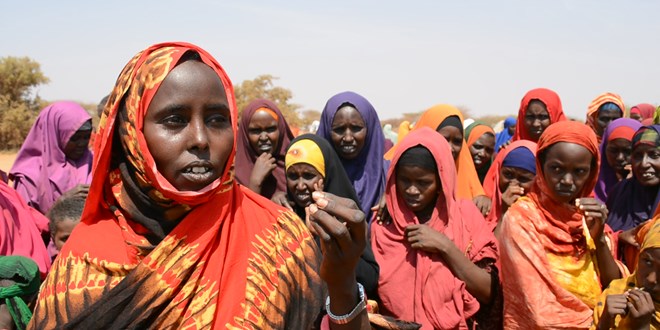UK Government allocates £16 million to critical drought response in Somalia

The UK Government has announced it will fund a £16 million programme to help avert famine in Somalia over the coming months. It will support more than 450 000 people with life-saving interventions and particularly food and water support.
The £16 million allocation is part of a wider UKAid drought intervention for Somalia totalling £110 million.
The £16 million programme will start immediately through seven non-governmental organisations working as a consortium in Somalia: Norwegian Refugee Council, Action against Hunger, Cesvi, Concern Worldwide, Danish Refugee Council, International Rescue Committee and Save the Children.
Reaching over 450,000 people
newsinsdieThe new grant will allow the Building Resilient Communities in Somalia (BRCiS) Consortium1 to reach 331,000 people with emergency food assistance. In addition, the programme will provide safe drinking water to over 125,000 people in the coming weeks.
The NRC-led BRCiS Consortium, in partnership with DFID, has been helping to strengthen the capacity of Somalis to withstand small-scale shocks and adapt to change for the last four years.
“The programme has shown success,” said the Norwegian Refugee Council’s Country Director in Somalia, Victor Moses, “but the scale of this drought is that of a freight train hitting a car. It requires a large-scale intervention if we want to avoid famine and minimize potential losses to gains that have been made with resilience building interventions.”
On the brink of famine
The humanitarian situation in Somalia is rapidly worsening. Half of the population – 6.2 million out of 12.3 million people – are acutely food insecure and in need of humanitarian assistance. 363,000 children are acutely malnourished, of which 71,000 are suffering from severe acute malnutrition (FAO/FSNAU report, – February 2017). Should the April – June long rains fail, famine is projected to be very likely.
“With Somalia on the brink of famine, this funding could not have come at a better time,” said Victor Moses. “UKAid has shown its commitment to avert a wide-scale humanitarian disaster.
By starting the response immediately in ten districts of Somalia, we hope to save thousands of lives.”
Responding to drought
The BRCiS programme has built-in crisis response mechanisms through which partner NGOs have been addressing small-scale shocks while working on underlying causes of community vulnerability.
Since 2015, the Consortium has been responding to drought conditions using these built-in mechanisms.
In September 2016, the UK Government gave the consortium extra funding to scale up the response as many areas were already suffering from critical lack of food and water.
Our early response has already reached more than 390,000 people, with a range of life-saving services including health, nutrition, emergency access to water and food.
“Our livestock are dying every day, carcasses are everywhere,” said Halima, a Somali woman who has been affected by the drought in Belet Hawa district. “I lost 10 goats in a single day. They just started falling and dying. I decided to move away from the village, as I feared that my children would start falling and dying like my goats.”
The BRCiS consortium and UKAid will help people like Halima to avoid the worst.